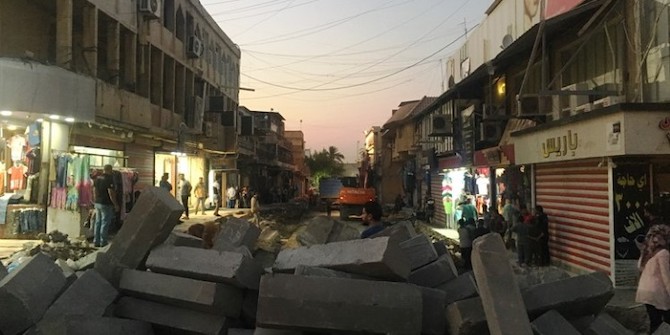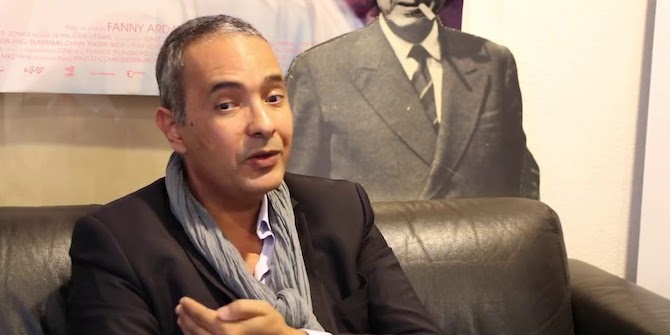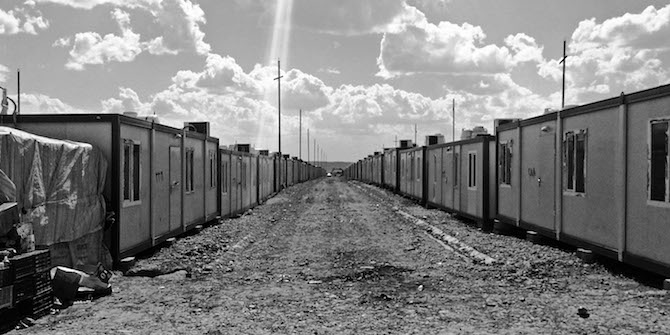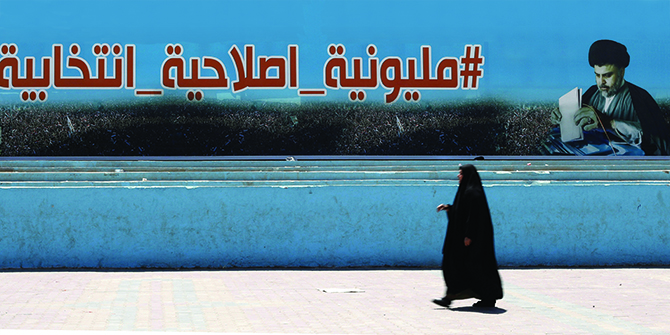by Omar Sirri

‘Lazmeen al-montaqa homa, wa ahna al-bazazeen…’
[The parties] control the area here. And we’re just the stray cats…[1]
Lina laughed when she said those words, even though she meant them. As someone who works in communications for agencies based in Karada, Lina frequents the area often. Her statement was meant to be an evocative commentary on contemporary Baghdad, one that might strike observers outside Iraq as odd. Increasingly common journalistic narratives suggest that after more than 15 years of violence, instability and war, Baghdad is experiencing renewed social-spatial stability. On the surface, such narratives are not wrong. But they are incomplete as they belie how the political economy of insecurity continues to function in Baghdad today, if in a different form than in past years. It is these conditions that Lina and others who I recently interviewed in Baghdad point to when discussing life in the city today.
‘Do you know the Burj al-Hayat Hotel?’ Lina asked me. ‘It’s the one around the corner that looks abandoned.’ The hotel, located towards the eastern end of Outer Karada Street, had been used by American military contractors early in the occupation of the city after 2003. This was one of the reasons why the hotel was targeted by militants, including in early 2004. Today, the building appears empty with many of its windows boarded up; its profiled architecture looks rather underwhelming because of this. But if you look more closely along the west side of the building, something peculiar becomes visible: new air-conditioning units have been installed and are in use. And on the south side, the man standing in front of the building entrance looks out of place, until you realise that he is a plain-clothed security guard who is doing more than just loitering.
Buildings and homes that appear abandoned are not unusual in Baghdad, and thus unremarkable; you pass by them enough times and your eyes just start to glaze over them. I wouldn’t have noticed any of this had Lina not told me as a matter of a fact how the site is being controlled by Asa’ib Ahl al-Haq (AAH), a parastatal armed group-turned-political party led by Qais al-Khazali. For Lina, such a reality is emblematic of the continued power and control that such groups exert in urban everyday life. Land and neighbourhood control are vital to maintaining relevance in a volatile political environment. Kita’ib Hezbollah, another group with influence in and around Karada – most prominently in high-end Arasat Street, parallel to Outer Karada Street – has also laid claim to the same hotel. This ongoing inter-group conflict helps explain why armed personnel have secured the building, both inside and out. As Lina suggested, such a move also helps AAH continue to support their most dedicated followers: ‘Those living in the hotel are known to be brothers of martyrs who were killed fighting for the party. That way the family can still collect salaries and be taken care of.’
Maintaining territorial presence indicates a kind of physical power that is respected if at times still challenged. But providing employment and financial benefits to party followers gestures towards a variegated economic context to the role of Baghdad’s armed groups. In the aftermath of the ‘Karada Disaster’ – a brutal truck bomb that three years ago killed anywhere between 325 to 450 people in the heart of Inner Karada Street – the heavily-populated area was locked down by security forces. For the next year, residents could only access the main street by foot. ‘Karada died’ people often recall, describing the conditions that followed the attack. Many Karadis described to me how in the year that followed, the fall in market activity and property prices allowed political parties and armed groups to snatch up local shops and properties from struggling owners on the cheap. These residents see such events as further evidence that the political parties themselves were responsible for the city’s years of devastating car bombs.
The rosy narratives about Baghdad’s returning stability often miss both the political-economic conditions that have been created, and what is being built in stability’s name. First, the modus vivendi among and between different armed groups and parties has meant a dividing up of neighbourhoods and districts in the city, in some ways mirroring Iraq’s muhassassa political system that divides the pie of ministries between the different political parties. Second, where the city is seeing physical transformations – like the springing up of new restaurants, malls and office buildings – such newness is intimately tied to warped economic conditions including rising inequality. Political-economic elites with access to economic capital and political connections are the key beneficiaries of such new developments while among ordinary Baghdadis unemployment rates remain high and their salaries low. (The official unemployment rate among youth is about 20 percent. But one interviewee told me the Ministry of Planning’s data shows the rate at more than double this, at 46 percent.)
Going beyond the surface of Baghdad’s renewed ‘stability’ means spotlighting the relationship between urban insecurity and the political economy of spatial transformations. Doing so moves us away from reinforcing the false dichotomy between stability and instability – between normality and exceptional violence – and instead raises questions about what everyday life in Iraq’s most important city is transforming into.
[1] Interview with Lina (pseudonym), Karada, Baghdad, May 2019.
*This blogpost introduces the LSE research project Baghdad’s Market Spaces and the Politics of Urban “Renewal” by Omar Sirri, examining the political economy of space in Baghdad’s marketplaces. This project forms part of the Conflict Research Small Grants Programme, funded by the UK Department for International Development to provide research and policy advice on how the risk and impact of violent conflict might be more effectively reduced through development and governance interventions.
Omar Sirri is a PhD candidate in political science at the University of Toronto. His doctoral dissertation is an ethnography of law and security practices in contemporary Baghdad, and their relationship to political-economic transformations across the city.








How do you think the situation in Baghdad will look like in the coming years if the private sector starts to be more active? As a Baghdadi woman I care to hear about your vision for the city.